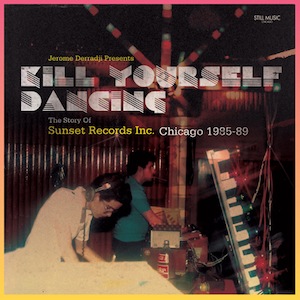Various Artists Kill Yourself Dancing: The Story of Sunset Records Inc. Chicago 1985-89
Curated by house archivist and DJ Jerome Derradji, Kill Yourself Dancing: The Story of Sunset […]

Curated by house archivist and DJ Jerome Derradji, Kill Yourself Dancing: The Story of Sunset Records Inc. Chicago 1985-89 contains 21 remastered tracks from the archives of Sunset Records, a label that has largely been neglected in the story of Chicago house. Founded in 1985 by Matt Warren, Miguel Garcia, and Ralphi Rosario, the label grew out of a DJ collective called Sunset Mobile Disco that, beginning in the early ’80s, was famed on Chicago’s North Side for having the most powerful soundsystem around, and for its eclectic mixes featuring disco, new wave, and salsa. This eclecticism carried over into the label, whose productions were distinguished by their new-wave, Italo, and freestyle influences, in contrast to the more classic Chicago house sound epitomized by the labels Trax and DJ International.
The compilation’s opening track, the titular “Kill Yourself Dancing,” is a joint production from Rosario and Warren under the name Razz, and comes barreling out of the gate with its hyper-aggressive use of claps, electro bassline, and repeated vocal refrain, which simply implores, “Kill!” Master Plan’s “Electric Baile (Commercial Mix)” showcases the label’s more Italo- and boogie-influenced side with its irresistible groove, icy synths, and faux-European vocals from Pepper Gomez. Similarly, Kajsa’s “Try Try Again (House Mix)” offers a thick electro bassline, horror-movie synths, and uplifting house piano, which culminates with vocals chanting the track’s title. There is a surprising diversity to the tracks on Kill Yourself Dancing; alongside the new-wave- and pop-leaning flourishes on many of the tracks are some early examples of straight-up jack and acid tracks. White Knight’s “White Knight Jacks (Club Mix)” is exactly what the title suggests and features impressively tough and skeletal beats, while the same group’s “Acid Dub” is decent enough, but fails to differentiate itself from every other acid track floating around at the same time.
On the whole, Kill Yourself Dancing offers up a selection of obscure and largely undiscovered gems. There’s nothing of the caliber of, say, Marshall Jefferson’s “Move Your Body” or Frankie Knuckles’ “Let the Music (Use You),” but that’s not why collections like this exist. Like Derradji’s previous compilations, 122 BPM: The Birth Of House Music and In The Dark: The Soul Of Detroit & The American Boogie Down, Kill Yourself Dancing has a completist mandate, and accompanied by a comprehensive 23-page booklet detailing the label’s brief history, the collection offers an intriguing alternate vantage point of Chicago house.

